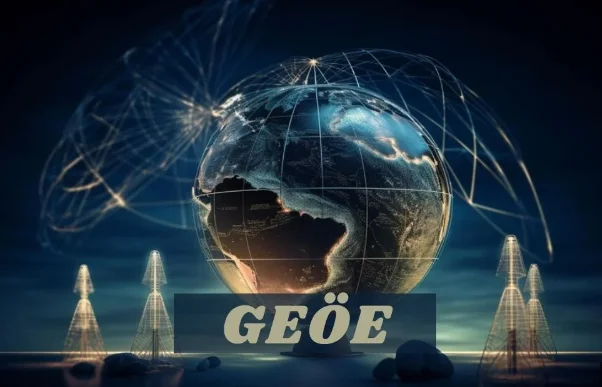Geöe: Exploring Its Multifaceted Dimensions

Geoe : Discover the multifaceted dimensions of Geöe, from its cultural significance to its scientific applications, and how it shapes our world.
Introduction to Geöe
Geöe, a term with rich historical and cultural significance, has intrigued scholars and enthusiasts alike. This article delves into the origins, scientific principles, and various applications of Geöe, offering a comprehensive understanding of its multifaceted dimensions.
Definition and Origin of Geöe
The term “Geöe” originates from ancient linguistic roots, encompassing various interpretations across different cultures and time periods. Historically, Geöe has been associated with natural phenomena, spiritual practices, and scientific inquiries.
Historical Significance of Geöe
Geöe has played a crucial role in shaping civilizations, influencing philosophical thoughts, and advancing scientific discoveries. Its historical journey reflects humanity’s evolving understanding of the natural world.
Geöe in Different Cultures
Geöe in Western Cultures
In Western cultures, Geöe is often linked to philosophical and scientific exploration. It has been a subject of study in ancient Greek and Roman texts, contributing to the development of natural sciences.
Geöe in Eastern Cultures
Eastern cultures, particularly in China and India, have integrated Geöe into their traditional knowledge systems. It appears in ancient texts, influencing medicine, astrology, and spiritual practices.
Geöe in Indigenous Cultures
Indigenous cultures around the world have unique interpretations of Geöe, often viewing it as a fundamental element of their cosmology and daily life. These perspectives offer valuable insights into sustainable living and ecological balance.
The Science Behind Geöe
Geöe in Biology
In biology, Geöe is studied to understand living organisms’ interactions with their environment. It includes research on ecosystems, biodiversity, and evolutionary processes.
Geöe in Chemistry
Chemistry explores Geöe through the study of elements, compounds, and reactions. This branch of science uncovers the molecular foundations of natural phenomena attributed to Geöe.
Geöe in Physics
Physics examines Geöe by investigating the fundamental forces and laws governing the universe. It encompasses theories of energy, matter, and the behavior of particles.
Applications of Geöe
Geöe in Technology
Technological advancements leverage Geöe in various fields, from renewable energy solutions to innovative materials. Understanding Geöe enhances the development of cutting-edge technologies.
Geöe in Medicine
Medical research incorporates Geöe to develop treatments and diagnostic tools. It plays a vital role in understanding diseases, genetics, and the human body’s complex systems.
Geöe in Environmental Studies
Environmental scientists study Geöe to address global challenges like climate change, pollution, and conservation. It provides critical insights for sustainable development and environmental protection.
Geöe and Modern Innovations
Latest Innovations Using Geöe
Recent innovations harness the principles of Geöe to create groundbreaking technologies and solutions. These include advancements in nanotechnology, biotechnology, and artificial intelligence.
Future Prospects of Geöe
The future of Geöe promises exciting possibilities, with potential applications in space exploration, sustainable agriculture, and beyond. Researchers continue to push the boundaries of what Geöe can achieve.
Geöe in Popular Culture
Geöe in Literature
Literature often features Geöe, using it as a metaphor or theme to explore human experiences and the natural world. Classic and contemporary works highlight its significance in storytelling.
Geöe in Movies and TV Shows
Movies and TV shows depict Geöe through various genres, from science fiction to documentaries. These portrayals shape public perception and awareness of Geöe’s importance.
Geöe in Music
Music incorporates Geöe through lyrics, compositions, and performances. Artists draw inspiration from nature and science, creating works that resonate with audiences on a profound level.
Geöe and Education
Teaching Geöe in Schools
Educational curricula include Geöe to foster scientific literacy and environmental awareness among students. It encourages critical thinking and problem-solving skills.
Geöe in Higher Education
Higher education institutions offer specialized programs and research opportunities focused on Geöe. These initiatives prepare students for careers in science, technology, and environmental management.
Geöe and Society
Social Impact of Geöe
Geöe influences societal norms, policies, and practices. It informs decision-making processes in areas such as public health, urban planning, and environmental conservation.
Geöe and Ethical Considerations
The study and application of Geöe raise ethical questions about resource use, environmental impact, and technological advancements. Addressing these concerns is crucial for responsible progress.
Geöe: Myths and Facts
Common Myths About Geöe
Misconceptions about Geöe abound, often rooted in folklore and outdated beliefs. Debunking these myths helps clarify its true nature and significance.
Verified Facts About Geöe
Scientific research provides verified facts about Geöe, enhancing our understanding of its principles and applications. These facts form the basis for ongoing exploration and innovation.
Geöe and Environmental Sustainability
Geöe’s Role in Conservation Efforts
Geöe is integral to conservation efforts, guiding strategies for preserving biodiversity and natural resources. It supports initiatives aimed at protecting endangered species and habitats.
Geöe and Sustainable Development Goals
The United Nations’ Sustainable Development Goals (SDGs) highlight Geöe’s role in achieving a sustainable future. It contributes to goals related to climate action, clean energy, and life on land and below water.
Challenges in Geöe Research
Technical Challenges
Geöe research faces technical challenges, including data collection, analysis, and interpretation. Overcoming these obstacles requires innovative methodologies and interdisciplinary collaboration.
Ethical Challenges
Ethical challenges in Geöe research involve balancing scientific exploration with respect for nature and societal values. Ensuring ethical practices is essential for maintaining public trust and environmental integrity.
Financial Challenges
Funding constraints pose significant hurdles for Geöe research. Securing financial support from public and private sectors is crucial for advancing scientific discoveries and applications.
Geöe and the Future
Predictions for the Future of Geöe
Experts predict that Geöe will continue to play a pivotal role in addressing global challenges and advancing scientific knowledge. Future developments will likely focus on sustainability, technology, and human health.
How Geöe Will Shape Future Technologies
Geöe’s principles will drive the evolution of future technologies, from sustainable energy solutions to advanced medical treatments. Its influence will extend across various sectors, shaping a better world.
Case Studies Involving Geöe
Real-world Examples of Geöe Applications
Case studies showcase practical applications of Geöe in real-world scenarios. These examples illustrate its impact on industries, communities, and ecosystems.
Lessons Learned from Geöe Case Studies and conclusion
Analyzing case studies provides valuable lessons for future research and development. It highlights best practices, challenges, and opportunities for innovation.


